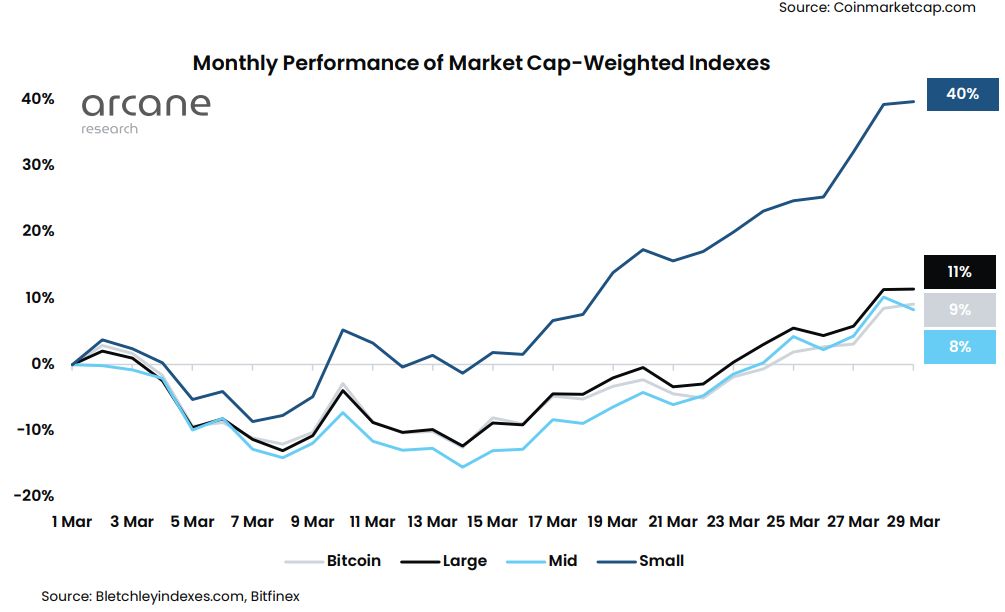(Bloomberg) — Bitcoin is taking a pause following a sharp rise in recent days that saw it reach its highest levels of the year.
The largest cryptocurrency fell as much as 2.2% on Tuesday to trade around $46,908, its first down day in six. The drop follows a break-neck surge of roughly 20% since mid-March, which had helped it wipe out all 2022 losses and accumulate gains of roughly 2% for the year. And Tuesday’s downturn comes as U.S. stocks — which crypto markets have largely moved in tandem with all year — gained amid optimism for progress in talks between Russia and Ukraine.
Bitcoin is “a highly speculative investment,” said Megan Horneman, chief investment officer for Verdence Capital Advisors, adding that it’s undergone a number of tests, including acting as an inflation hedge, which it has “failed miserably in the midst of this turmoil.”
But crypto-market participants remain bullish, with many saying the stream of earlier selloffs were overdone. Fans expressed optimism it might, with the recent surge, be set up for a further advance.
There are “no more sellers left after several waves of bad news — leverage wipe-out, macro concerns, Ukraine war,” Kyle Davies, co-founder and chairman of Singapore-based crypto hedge fund Three Arrows Capital, said. “So it’s natural for Bitcoin to have a strong bid here.”
More than $230 million worth of short positions on leveraged Bitcoin products were liquidated since Monday, according to data from Coinglass, as Bitcoin briefly moved above $48,000. The on-going short liquidations, while Bitcoin’s spot volume rose relative to futures volume over the past few days, indicate the recent recovery was mostly spot-market driven, according to Josh Olszewicz, head of research at crypto management firm Valkyrie.
Jeff Dorman, chief investment officer at crypto asset management firm Arca, argues that historically, risk assets tend to move higher in the aftermath of a rate hike by the Federal Reserve, which the central bank announced earlier this month.
“The entire risk-assets selloff was way overdone and made no sense to begin with,” Dorman said in an interview. “Markets generally go higher during rate hikes, and it’s only at the end of a rate-hike cycle when markets typically go the other way.”
Bitcoin, the oldest cryptocurrency, had been stuck in a tight range for most of the first three months of 2022 amid tightening monetary policies and higher interest rates around the world. Some analysts had previously predicted that without central-bank money printing, Bitcoin would lack a “real catalyst” to push its prices higher.
But now with Bitcoin’s latest rally — which wiped away all of its year-to-date losses — some predict that investors are ready to jump back into the digital-asset market, emboldened by news of large Bitcoin purchases by Singapore-based Luna Foundation Guard.
“Funds and other market participants are sitting on big cash allocations,” Three Arrows’ Davies said. “As Bitcoin grinds up, I expect many to chase the market higher.”
The total amount of U.S. dollar-pegged stablecoins including Tether, USDC, and Binance USD sitting on centralized exchanges — an indication of the amount of cash sitting on the sidelines that might be deployed to buy digital assets — went up sharply between the end of January and the beginning of February, according to Glassnode.
Meanwhile, the number of Bitcoins on centralized exchanges has dropped from 2.556 million to 2.499 million since March 10, Glassnode’s data shows. Moving a large amount of the coin off exchanges in a short period of time, according to Valkyrie’s Olszewicz, requires “substantial USD investment,” indicating renewed interest from institutional investors.
Still, while indexes tracking larger cryptocurrencies have seen “acceptable gains” this month, it’s a gauge of small-cap tokens that’s notched the most striking advance, according to a report from Arcane Research. The small-cap measure tracked by the firm has seen “massive gains” from just a handful of coins, with its largest constituent, Waves, up roughly 300%.
Shawn Cruz, senior market strategist at TD Ameritrade Inc., says that trend reminds him of how tech companies have tended to move in years past, when the entire Faang cohort, for instance, moved in unison for a long time before correlations broke down.
“As that market just gets a little bit more differentiated in terms of the names that are in there, you start to see them move in a little bit more of an individual basis as investors learn how to parse all the different components,” he said by phone. “The crypto spaces will do the same as people become more familiar with it and will be a lot more selective around which individual coins they have.”
More stories like this are available on bloomberg.com
©2022 Bloomberg L.P.











